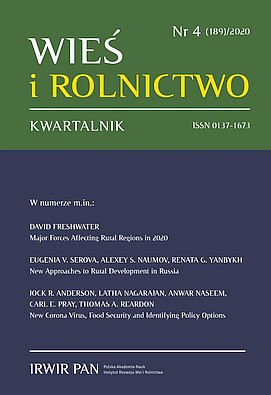New Approaches to Rural Development in Russia
DOI:
https://doi.org/10.53098/wir042020/02Keywords:
rural areas, social and economic development, state policy, COVID-19, RussiaAbstract
As many other countries, Russia suffers from fast depopulation of rural areas and decline of rural economy. For years, the state policy for mitigate negative consequences of these processes was considering agriculture as the main pillar of rural development and most of governmental finding was oriented to its support. Recently, the new state strategy for rural development was formulated, and in 2019 an ambitious national program approved. It assumes different options for rural territories to develop economy and achieve welfare, depending on natural and human resources availability, remoteness and other features. The paper presents a review of the current state of rural areas of the Russian Federation. It focuses on the main issues the countryside faces at the national level and also reveals regional differences in rural development. The study is based mainly on the author’s analysis of national statistical data sources, including the Russian Agricultural census of 2016, and the results of conducted survey. Possible effects of the measures of the new state policy of rural development such as encouraging community-based initiatives and promotion of housing construction through preferential rural mortgage loans programs are analysed. Finally, the authors provide a brief description of impact of the COVID-19 pandemic on rural development in Russia and attempt to forecast its further implications.
References
E`fendiev A.G., Bolotina I.A. (2002). Sovremennoe rossijskoe selo: na perelome e`pox i reform. Opy`t institucional`nogo analiza [The contemporary Russian village: on the boundary of change of epoch]. Mir Rossii: Sociologiya, e`tnologiya, 4, 83–125.
EP (European Parliament) (2011). The CAP in the EU Budget: New Objectives and Financial Principles for the Review of the Agricultural Budget after 2013. Brussels: European Parliament, Directorate for Internal Policies: Agriculture and Rural Development. Retrieved from: https://www.europarl.europa.eu/RegData/etudes/etudes/join/2011/460054/IPOL-AGRI_ET(2011)460054_EN.pdf
Mantino F. (2008). Rural Development in Europe. Policy, Institutes and Stakeholders since 1970-th till our Days. Rome: FAO.
Nefedova T.G. (2012). Osnovny`e tendencii izmeneniya social`no-e`konomicheskogo prostranstva sel`skoj Rossii [The main trends of changes of social and economic space]. Izvestiya RAN. Seriya Geograficheskaya, 3, 5–21.
Rosstat (2016). Agricultural Census of 2016. Moscow: Rosstat (Federal State Statistic Service).
Rosstat (2019). Employment in Agriculture, Forestry, Fish Farming and Fisheries. Russia and the Countries of the World. Collection of Rosstat. Moscow: Rosstat (Federal State Statistic Service). Retrieved from: https://gks.ru/bgd/regl/b18_39/Main.htm
RG (Russian Government) (2019a). State Programme “Comprehensive Development of Rural Territories”. Government of the Russian Federation, 19th of May, 2019. Moscow: Russian Government.
RG (Russian Government) (2019b). Strategy for Spatial Development of the Russian Federation for the Period up to 2025. No. 207, 13th of February, 2019. Retrieved from: https://www.economy.gov.ru/material/file/a3d075aa813dc01f981d9e7fcb97265f/130219_207-p.pdf
Serova E., Yanbykh R., Naumov A. et al. (2020). O sostoianii sel’skih territori Rossiiskoi Federatsii v 2018 godu: Annual Monitoring [On the state of rural territories of the Russian Federation in 2018. Monitoring]. Pravdinskiy, Moscow Oblast: Rosinformagrotech.
Shik О., Serova Е., Yanbykh R. (2020). Issledovanie systemi byudzhetnoi podderzhki agrarnogo sektora v Rossii [Study of the system of budgetary support for the agricultural sector in Russia]. Voprosy gosudarstvennogo i munitsipal’nogo upravleniia, 2, 145–167.
Yanbykh R., Saraykin V., Lerman Z. (2019). Cooperative tradition in Russia: A revival of agricultural service cooperatives? Post-Communist Economies, 31 (6), 750–771. DOI: https://doi.org/10.1080/14631377.2019.1607439
WB (World Bank) (2019). Agriculture, Forestry, and Fishing, Value Added (% of GDP). Washington, D.C.: World Bank. Retrieved from: https://data.worldbank.org/indicator/NV.AGR.TOTL.ZS.
Downloads
Article file downloads
Pages
How to Cite
Issue
Section
License
Copyright (c) 2021 Wieś i Rolnictwo

This work is licensed under a Creative Commons Attribution 4.0 International License.










